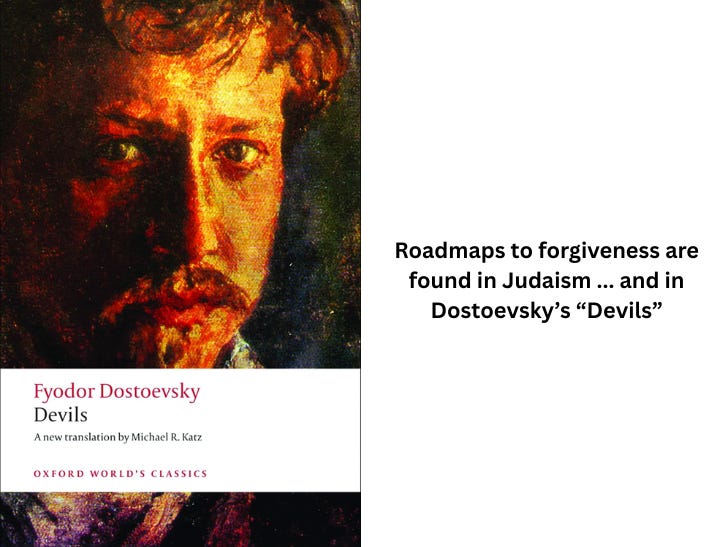Forgiveness
How to get it. And how not to.
We are fast approaching (pun intended) Yom Kippur, the Day of Atonement. And I just finished Dostoevsky’s novel “Devils,” whose best chapter (IMHO) delves into the issue of forgiveness.
How’s that for a confluence? Both Jewish tradition and the Russian novelist tackle this thorny issue head-on.
In Judaism, we don’t devote just any day to seeking atonement. We make it the singular focus of the holiest day of the year.
In “Devils,” Dostoevsky’s most underrated novel, he detours from the book’s propulsive story line to explore some of the nuances of sin and forgiveness.
To set the scene, one of the main characters, Stavrogin, meets with a priest to share a long, written confession. The nature of Stavrogin’s sin was so shocking, however, that Russian censors removed the chapter from the original book. In fact, some older English translations also omit the chapter, innocuously titled “At Tikhon’s.”
This is a shame, since “At Tikhon’s” ranks among Dostoevsky’s most memorable chapters, maybe just a cut below “The Grand Inquisitor” in “The Brothers Karamazov.”
In “At Tikhon’s,” Stavrogin confesses to the statutory rape of a young girl who, shortly afterwards, commits suicide. He tells the priest that he plans to give copies of the confession to friends, relatives and even the media. Yes, it’s uncomfortable to read and ponder, to put it mildly.
Stavrogin expects the priest to approve of his confession and of his plans to circulate it widely. The confession will ruin his reputation and destroy his career. But to his dismay, the priest questions his true intentions.
“You’re struggling with a desire for martyrdom and self-sacrifice. Overcome this desire of yours, put aside those sheets of paper – then you’ll overcome everything. You’ll disgrace your own pride. Then you will achieve freedom,” the priest tells him.
Boy, could I relate. Without getting into the gory details, when I look back at the worst thing I ever did, I felt a strong desire afterward for castigation and flagellation. When I went to see a therapist, however, he urged me to forgive myself.
I was so disappointed with that advice, I never returned to that therapist. But, in retrospect, he was right. Maybe he had read “At Tikhon’s.” Only by forgiving myself could I move forward in life.
Judaism offers a specific protocol to achieve atonement. For a sin against God, you can obtain forgiveness by showing up on Yom Kippur. Easy peasy, right?
For a sin committed against another person, it is a little more difficult. If you’re truly sorry, you have to ask the injured party for forgiveness – multiple times, if necessary. If the victim is dead, as was the case in Stavrogin’s story, you have to visit the gravesite and beg forgiveness there.
The reason Judaism offers a formula for forgiveness is to prevent us from falling into a bottomless pit of guilt. In “Devils,” Dostoevsky warns us about the dangers of that type of despair.
May we all emerge from this Yom Kippur with a clean slate and a commitment to be our best selves in the year ahead.



